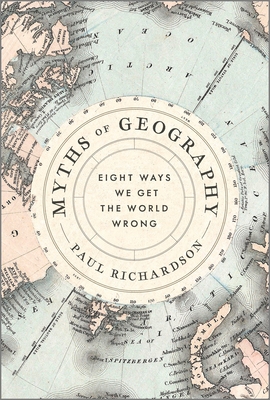
description
8Is geography really destiny?
Our maps may no longer be stalked by dragons and monsters, but our perceptions of the world are still shaped by geographic myths. Myths like Europe being the center of the world. Or that border walls are the solution to migration. Or that Russia is predestined to threaten its neighbors.
In his punchy and authoritative new book, Paul Richardson challenges recent popular accounts of geographical determinism and shows that how the world is represented often isn't how it really is--that the map is not the territory. Eight authoritative chapters puncture long-held assumptions:
Along the way we visit some remarkable places: Iceland's Thingvellir National Park, where you can swim between two continents, and Bir Tawil in North Africa, one of the world's only territories not claimed by any country. We follow the first train that ran across Eurasia between Yiwu in east China and Barking in east London, and scale the US-Mexico border wall to find out why such fortifications don't work.
Written with verve and full of quotable facts, Myths of Geography is a book that will turn your world upside down.
Our maps may no longer be stalked by dragons and monsters, but our perceptions of the world are still shaped by geographic myths. Myths like Europe being the center of the world. Or that border walls are the solution to migration. Or that Russia is predestined to threaten its neighbors.
In his punchy and authoritative new book, Paul Richardson challenges recent popular accounts of geographical determinism and shows that how the world is represented often isn't how it really is--that the map is not the territory. Eight authoritative chapters puncture long-held assumptions:
- The Myth of the Continents and why they don't add up
- The Myth of the Border and why walls like Trump's don't work.
- The Myth of the Nation and fuzzy boundaries.
- The Myth of Sovereignty and Taking Back Control
- The Myth of Economic Growth and Why It's Not Worth Dying for
- The Myth of Russia's inevitable expansionism
- The Myth of China's New Silk Road
- The Myth of a doomed Africa
Along the way we visit some remarkable places: Iceland's Thingvellir National Park, where you can swim between two continents, and Bir Tawil in North Africa, one of the world's only territories not claimed by any country. We follow the first train that ran across Eurasia between Yiwu in east China and Barking in east London, and scale the US-Mexico border wall to find out why such fortifications don't work.
Written with verve and full of quotable facts, Myths of Geography is a book that will turn your world upside down.
member goods
No member items were found under this heading.
Return Policy
All sales are final
Shipping
No special shipping considerations available.
Shipping fees determined at checkout.







